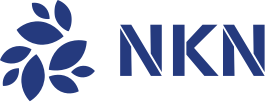NKN, short for New Kind of Network, is a project aiming to rebuild the Internet that will be truly open, decentralized, dynamic, safe, shared and owned by the community.
Official website: https://nkn.org/
The core of the NKN network consists of many connected nodes distributed globally. Every node is only connected to and aware of a few other nodes called neighbors. Packets can be transmitted from any node to any other node in an efficient and verifiable route. Data can be sent to any clients without public or static IP address using their permanent NKN address with end-to-end encryption.
The relay workload can be verified using our Proof of Relay (PoR) algorithm. A small and fixed portion of the packets will be randomly selected as proof. The random selection can be verified and cannot be predicted or controlled. Proof will be sent to other nodes for payment and rewards.
A node in our network is both relayer and consensus participant. Consensus among massive nodes can be reached efficiently by only communicating with neighbors using our consensus algorithm based on Cellular Automata. Consensus is reached for every block to prevent fork.
More details can be found in our wiki.
- Transmit any data to any node/client without any centralized server. Related tech design doc
- Proof-of-Relay, a useful proof of work: mining is relaying data. Related tech design doc
- Extremely scalable consensus algorithm (millions or even billions of nodes). Related tech design doc
- Strong consistency rather than eventual consistency. Related tech design doc
- Dynamic, large-scale network.
- Verifiable topology and routes. Related tech design doc
- Next generation address scheme with public key embedded. Related tech design doc
To build from source, you need a properly configured Go environment (Go 1.8+, $GOROOT and $GOPATH set up, see Go Official Installation Documentation for more details).
Create directory $GOPATH/src/github.com/nknorg/ if not exists
In directory $GOPATH/src/github.com/nknorg/ clone the repository
$ git clone https://github.com/nknorg/nkn.gitInstall package management tool glide if it's not installed on your system.
$ cd nkn
$ make glideDownload dependencies for building
$ make vendorBuild the source code with make
$ make allAfter building is successful, you should see two executables:
nknd: the nkn node programnknc: command line tool for nkn node control
Note: this repository is in the early development stage and may not have all functions working properly. It should be used only for testing now.
Create several directories to save exectuable files nknd nknc and
config file config.json. Create new wallet in each directory
$ ./nknc wallet -c
Password:
Re-enter Password:
Address Public Key
------- ----------
NjCWGM1EfJeopJopSQGC6aLEkuug5GiwLM 03d45f701e7e330e1fd1c7cce09ffb95f7b1870e5c429ad8e8c950ddb879093f52Config the same bootstrap node address and public key to each
config.json file, for example:
{
"Magic": 99281,
"Version": 1,
"ChordPort": 30000,
"NodePort": 30001,
"HttpWsPort": 30002,
"HttpJsonPort": 30003,
"Hostname": "127.0.0.1",
"LogLevel": 1,
"IsTLS": false,
"ConsensusType": "ising",
"SeedList": [
"127.0.0.1:30000"
],
"GenesisBlockProposer": [
"03d45f701e7e330e1fd1c7cce09ffb95f7b1870e5c429ad8e8c950ddb879093f52"
]
}Note that ports in different config.json does not need to be different,
conflict in ports will be resolved automatically.
Start bootstrap node by creating a network
$ ./nknd -test createStart other nodes by joining the network
$ ./nknd -test joinWhen the network contains enough nodes (usually 8+), stop the node that created the network in order for the relay service to work properly. Nodes joining the network later should use a live node as seed.
Build and tag Docker image
$ docker build -t nkn .When starting the container, a local directory containing config.json and
wallet.dat (if exists) should be mapped to /nkn directory in the container.
This local directory will also be used for wallet, block data and logs storage.
Assuming the local directory is the current directory, creating a wallet can be
done by
$ docker run -v $PWD:/nkn -it nkn nknc wallet -cStart bootstrap node by creating a network
$ docker run -p 30000-30003:30000-30003 -v $PWD:/nkn -it nkn nknd -test createStart other nodes by joining the network
$ docker run -p 30000-30003:30000-30003 -v $PWD:/nkn -it nkn nknd -test joinCan I submit a bug, suggestion or feature request?
Yes. Please open an issue for that.
Can I contribute patches to NKN project?
Yes, we appreciate your help! To make contributions, please fork the repo, push your changes to the forked repo with signed-off commits, and open a pull request here.
Please follow our Golang Style Guide for coding style.
Please sign off your commit. This means adding a line "Signed-off-by: Name " at the end of each commit, indicating that you wrote the code and have the right to pass it on as an open source patch. This can be done automatically by adding -s when committing:
git commit -s
